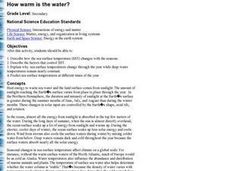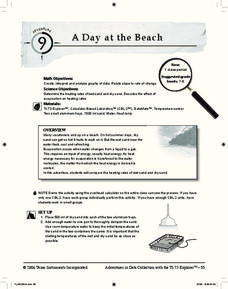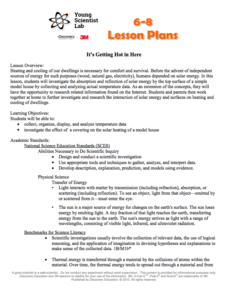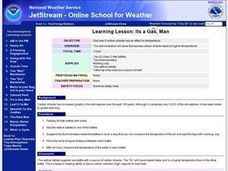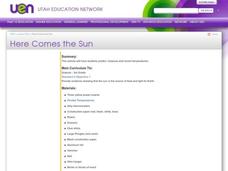Curated OER
Thermodynamics Worksheet
In this thermodynamics worksheet, students answer eight questions about reactions that involve change in entropy, they identify reactions as spontaneous or non-spontaneous and they solve problems using the laws of thermodynamics.
Curated OER
Demonstration of Cheese-Making Enzyme Magic
Students watch a demo which is a modification of an enzyme lab which is done as a "magic show". It's primary purpose is to tickle the curiosity of the student and grab interest before discussion of enzymes. It is also used to stimulate...
Curated OER
Bing! Bang! Boom!
Sixth graders investigate heat energy, conduction, convection, and radiation.
Curated OER
Ice Ain't Easy
Students are told that objects in contact with one another reach an equilibrium temperature. A hot object placed in a cool liquid always cool off. It never happens that the object gets hotter and cool liquid gets colder. Students predict...
Curated OER
Sun or Shade?
Third graders use a thermometer to measure the air temperature in several places around the school and then graph the data. They grow 3 plants in different sunlight and record the growth.
Curated OER
How Warm is the Water?
Pupils research how surface sea temperature changes throughout the year. They draw a time series of sea surface temperatures for each month of the year and a depth profile for a summer and winter month using an OceanExplorer Profiler tool.
Curated OER
Insulation-Black and White
Eighth graders construct 2 different model homes out of manila folders in order to examine how heat is transferred by means of radiation and convection. Activity allows students to interpret how different colors or material affect the...
National Energy Education Development Project
Introduction to Wind Energy
The U.S. produced enough wind energy in 2015 to power all of the homes in Alaska, California, Delaware, the District of Columbia, Hawaii, Idaho, Maine, Montana, Nebraska, New Hampshire, North Dakota, Rhode Island, South Dakota, and...
American Chemical Society
Changing State: Evaporation
Why do experiments require a control? Guide scholars through designing an experiment to see what they can do to evaporate water faster with a lesson that stresses the importance of controlling all variables. The second activity allows...
Curated OER
States Of Matter
Delv into the states of Matter. Students engage in the scientific inquiry process to uncover the exciting world of Matter. They watch a series of videos, and conduct experiments in order to collect and analyze data on the various state...
US Environmental Protection Agency
Carbon Through the Seasons
Meteorologists view an animated video by the Environmental Protection Agency to learn how the carbon cycle works, and then move into groups to analyze and graph actual data of the atmospheric carbon dioxide concentration from Hawaii's...
California Academy of Science
Global Climate Change and Sea Level Rise
Ice is nice, and its condition on the planet has a significant effect. Junior geoscientists experiment with ice melting in both water and on land to discover how each affect the rising sea level. This detailed lesson outline even...
K-State Research and Extensions
The Crusty Earth
Geology rocks — literally! A geology chapter offers eleven activities at four different levels. Scholars enjoy completing hands-on experiments before applying critical thinking skills following a share, process, generalize, apply, and...
Curated OER
Sorting Plastics For Recycling
First, young chemists practice polymer identification by density and flame tests. With the data collected, they propose a method of separating polyethylene from other plastics and determine what property makes it desirable for recycling....
Texas State Energy Conservation Office
Investigation: Crank It Up!
Following this procedure, eager engineers construct a working model of a piston system, similar to that in an internal combustion engine. Perfect for STEM or automotive technology classes, the activity comes complete with analysis and...
Curated OER
A Day at the Beach
Help learners determine the rate of change for the temperature of sand. They will collect data on the temperature of wet and dry sand over time with a heat lamp overhead. Then make a scatter plot of the data and find a linear model to...
Discovery Education
It's Getting Hot in Here
Class members engage in a STEM experiment and investigate how materials affect heating in a house by creating models of houses and using different top surface materials. They record the temperature inside the models and consider what the...
Santa Monica College
The Composition of Potassium Chlorate
The third lesson in a series of 11 begins by using thermal decomposition of potassium chlorate to determine the mass percent of oxygen. Then a second activity allows scholars to demonstrate that the resulting residue is from a...
Curated OER
Go With the Flow!
Learners experiment with heat transfer in a countercurrent system and describe the importance of conduction in heat-energy transfer.
Curated OER
Calorimetry Exercises
In this calorimetry worksheet, students determine the specific heat and the heat of neutralization in the 2 problems they solve.
Curated OER
Warm Me Up!
Third graders explore and identify heat sources. They conduct an experiment involving thermometers and articles of clothing, and record and discuss the results.
Curated OER
Learning Lesson: Its a Gas, Man
Young scholars participate in a demonstration in which they examine the effect on temperature by carbon dioxide. They discuss the effects of carbon dioxide on the environment. They also examine summer safety rules to end the lesson.
Curated OER
Here Comes the Sun
Third graders watch a video on the solar system and examine the role of the sun. As a class, they complete a KWL chart and make different color temperature pockets to use during their experiment. In groups, they make predictions about...
Curated OER
Physics- global warming
Students discuss the concept of global warming and view a multimedia clip on the global warming phenomenon. They statistically analyze mean temperature data and compare a given set of data. Data on atmospheric CO2 is done then they...







